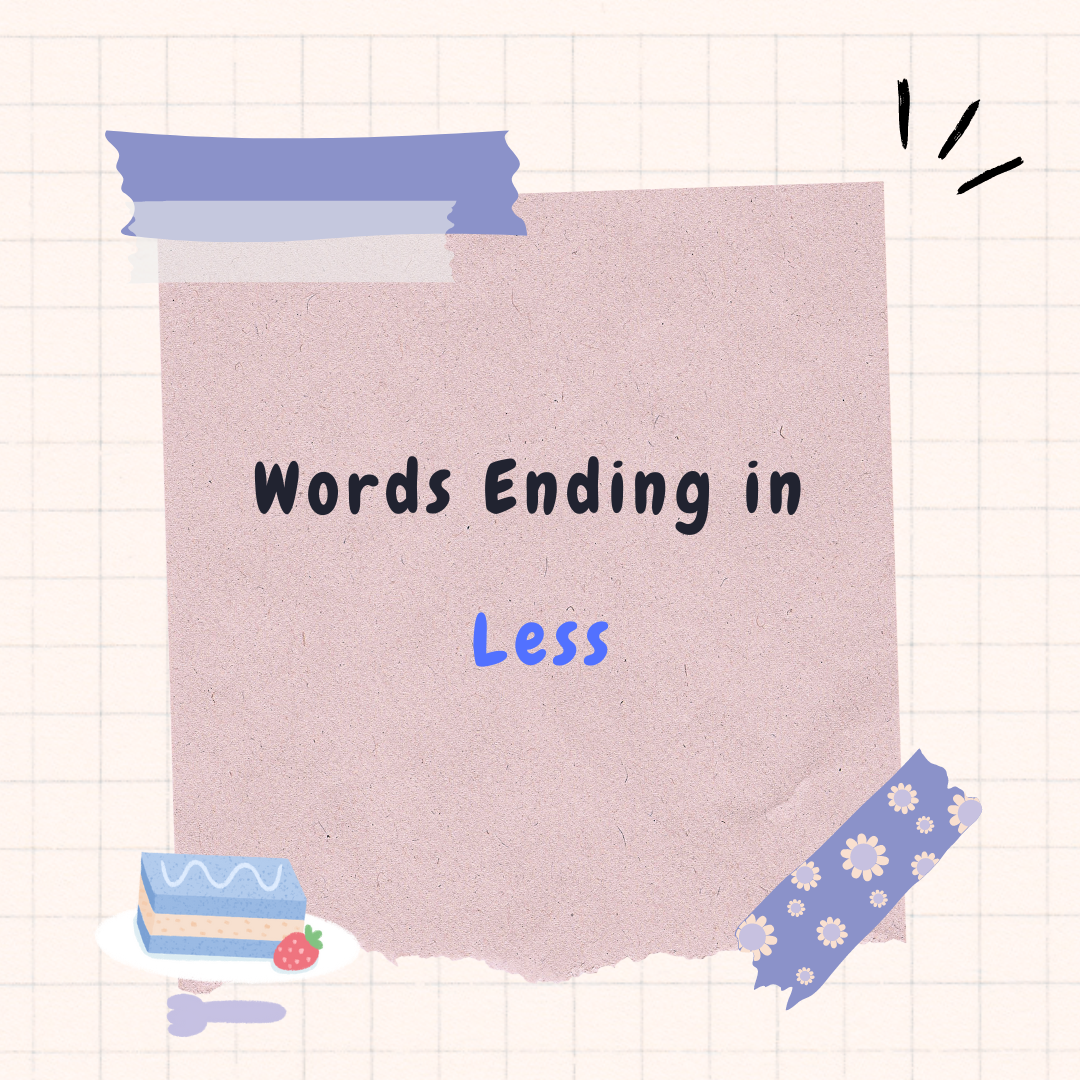The English language is rich with words that carry deep meanings through the use of various suffixes. One such suffix is “-less,” which imparts a specific nuance to words. In this article, we’ll explore the significance of words ending in less, their formation, usage, and impact on communication.
Introduction – Words Ending in Less
The suffix “-less” is a powerful tool in the English language, enabling the transformation of root words to convey the absence or lack of something. Words ending in less often carry a tone of deficiency or insufficiency, and they are essential for clear and precise communication.
Suffix “-less” Meaning
The suffix less meaning is “without” or “lacking.”
Definition of “less”
The suffix “-less” means “without” or “lacking.” When appended to a root word, it changes the word’s meaning to indicate the absence of the quality or thing described by the root word. For example, “fearless” means “without fear,” and “hopeless” means “without hope.”
How It Changes the Meaning of Root Words
The addition of “-less” to a root word negates the presence of the root word’s attribute. It transforms positive or neutral words into their negative counterparts. For instance, “end” becomes “endless,” meaning without an end, and “power” becomes “powerless,” meaning without power.
Common Characteristics of “less” Words
- Descriptive: “-less” words are often adjectives.
- Negative Connotation: They usually imply a lack or absence.
- Versatility: They can be used in various contexts to describe conditions, qualities, and states.
Common Words with Suffix “less”
Here are some common words with suffix less, along with their meanings & examples:
- Fearless: Without fear.
- Example: She was fearless in the face of danger.
- Hopeless: Without hope.
- Example: The situation seemed hopeless, but they persevered.
- Careless: Without care.
- Example: His careless mistakes cost him the job.
- Thoughtless: Without thought.
- Example: Her thoughtless comments hurt his feelings.
- Endless: Without end.
- Example: The possibilities are endless.
5-Letter Words Ending in “less”
List of 5-Letter Words Ending in “less”:-
- Bless – to ask for God’s help
- Cless – Scottish variant of class.
- Gless – a short form of two words God and Bless
Enroll in our best online English speaking course in India to improve English.
6-Letter Words Ending in “less”
Below are the 6-Letter Words Ending in “less”:-
- Ageless – Without aging or appearing to age.
- Blissless – Without bliss.
7-Letter Words Ending in “less”
Check out the 7-Letter Words Ending in “less”:-
- Blameless – Without blame; innocent.
- Boundless – Without limits; infinite.
- Timeless – Without a start or end; eternal.
8-Letter Words Ending in “less”
Read below for 8-Letter Words Ending in “less”:-
- Fearless – Without fear; brave.
- Hopeless – Without hope.
- Endless – Without end; infinite.
- Tireless – Without fatigue; energetic.
Positive Words Ending in “less”
Few Positive Words Ending in “less”:-
- Fearless – Brave and unafraid.
- Ageless – Never appearing to grow old.
- Boundless – Having no limits or boundaries.
- Timeless – Eternal and enduring.
- Limitless – Without limits or end.
FAQs – Words Ending in Less
- What does the suffix “-less” mean?
- The suffix “-less” means “without” or “lacking.”
- How do you form words with “-less”?
- By adding “-less” to a root word, often a noun or verb, you create a word that indicates the absence of the root word’s quality.
- Can you give examples of “-less” words?
- Examples include “fearless,” “hopeless,” “careless,” “thoughtless,” and “endless.”
- Are “-less” words always negative?
- While many “-less” words imply a negative absence, some like “fearless” can have positive connotations.
- How do “-less” words affect the tone of writing?
- “-less” words can influence the tone, adding seriousness, criticism, or positivity depending on the context.
Conclusion – Words Ending in Less
Words ending in less, are a fascinating and essential part of the English language, providing a clear and concise way to express the absence or lack of something. Understanding their formation, usage, and impact can enhance both written and spoken communication, making it more precise and expressive. Whether you’re describing a “fearless” hero or a “hopeless” situation, “-less” words offer a powerful way to convey meaning and emotion.
